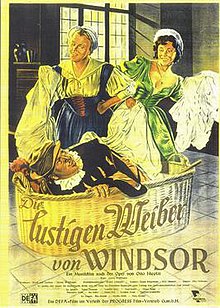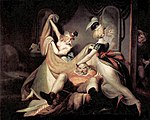
Sir John Falstaff is a fictional character who appears in three plays by William Shakespeare and is eulogised in a fourth. His significance as a fully developed character is primarily formed in the plays Henry IV, Part 1 and Part 2, where he is a companion to Prince Hal, the future King Henry V of England. Falstaff is also featured as the buffoonish suitor of two married women in The Merry Wives of Windsor. Though primarily a comic figure, he embodies a depth common to Shakespeare's major characters. A fat, vain, and boastful knight, he spends most of his time drinking at the Boar's Head Inn with petty criminals, living on stolen or borrowed money. Falstaff leads the apparently wayward Prince Hal into trouble, and is repudiated when Hal becomes king.

Falstaff is a comic opera in three acts by the Italian composer Giuseppe Verdi. The Italian-language libretto was adapted by Arrigo Boito from the play The Merry Wives of Windsor and scenes from Henry IV, Part 1 and Part 2, by William Shakespeare. The work premiered on 9 February 1893 at La Scala, Milan.

The Merry Wives of Windsor or Sir John Falstaff and the Merry Wives of Windsor is a comedy by William Shakespeare first published in 1602, though believed to have been written in or before 1597. The Windsor of the play's title is a reference to the town of Windsor, also the location of Windsor Castle in Berkshire, England. Though nominally set in the reign of Henry IV or early in the reign of Henry V, the play makes no pretence to exist outside contemporary Elizabethan-era English middle-class life. It features the character Sir John Falstaff, the fat knight who had previously been featured in Henry IV, Part 1 and Part 2. It has been adapted for the opera at least ten times. The play is one of Shakespeare's lesser-regarded works among literary critics. Tradition has it that The Merry Wives of Windsor was written at the request of Queen Elizabeth I. After watching Henry IV, Part 1, she asked Shakespeare to write a play depicting Falstaff in love.

Carl Otto Ehrenfried Nicolai was a German composer, conductor, and one of the founders of the Vienna Philharmonic. Nicolai is best known for his operatic version of Shakespeare's comedy The Merry Wives of Windsor as Die lustigen Weiber von Windsor. In addition to five operas, Nicolai composed lieder, works for orchestra, chorus, ensemble, and solo instruments.

Die lustigen Weiber von Windsor, or The Merry Wives of Windsor, is an 1849 opera in three acts by Otto Nicolai to a German libretto by Salomon Hermann Mosenthal based on Shakespeare's play. Published as a comical-fantastical work in three acts with dance (komisch-phantastische Oper in 3 Akten mit Tanz), its structure is musical numbers linked by spoken dialogue, harkening back to the then-outmoded Singspiel format. It remains popular in Germany and Austria and its overture is sometimes heard in concert in other countries.

Gottlob Frick was a German operatic bass. He was known for his wide repertory including Wagner and Mozart roles. Some of his most celebrated roles were Wagnerian villains such as Hunding and Hagen in Der Ring des Nibelungen, but others were noble characters like Sarastro in The Magic Flute or Gurnemanz in Parsifal or comic figures such as Osmin in Die Entführung aus dem Serail or Falstaff in The Merry Wives of Windsor. He sang at the leading European opera houses in the 1950s and 1960s and recorded all his major roles.
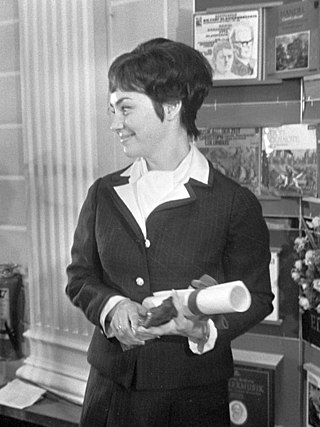
Edith Mathis is a Swiss soprano and a leading exponent of the works of Wolfgang Amadeus Mozart worldwide. She is known for parts in Mozart operas, but also took part in premieres of operas such as Henze's Der junge Lord.

Marie Gutheil-Schoder was an important German soprano.
Norman Foster was an American operatic bass-baritone, a film and television actor and a television producer.
Claus Holm was a German film actor. He appeared in 50 films between 1943 and 1979. He was born in Bochum, Germany and died in Berlin, Germany.
Franziska Gottwald is a German mezzo-soprano singer in opera and concert.
Love's Confusion is an East German romantic comedy film directed by Slátan Dudow. It was released in 1959.
Georg Wildhagen was a German screenwriter and film director. According to conflicting sources, he was born in either Hannover or in Hamburg.
Wilhelm Strienz was a German bass operatic singer.
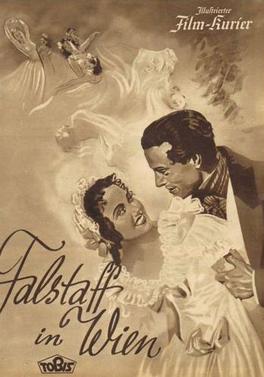
Falstaff in Vienna is a 1940 German musical comedy film directed by Leopold Hainisch and starring Hans Nielsen, Gusti Wolf and Paul Hörbiger. It portrays the life of the nineteenth century composer Otto Nicolai, known for works such as The Merry Wives of Windsor.
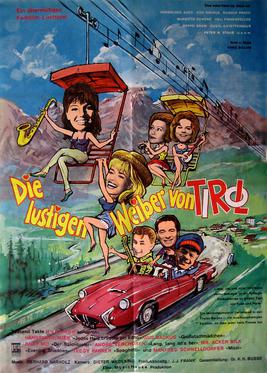
The Merry Wives of Tyrol is a 1964 West German musical comedy film directed by Hans Billian and starring Hannelore Auer, Gus Backus and Rudolf Prack.
The Merry Wives of Windsor is a 1918 German silent comedy film directed by William Wauer. It is an adaptation of William Shakespeare's The Merry Wives of Windsor.
The Merry Wives of Windsor is a 1965 Austrian-British historical comedy film directed by Georg Tressler and starring Norman Foster, Colette Boky and Charles Igor Gorin.

Margit Bokor, born Margit Wahl, was a Hungarian operatic soprano. She created the role of Zdenka in Arabella by Richard Strauss at the Semperoper in 1933, but then had to leave Germany. She was a member of the Vienna State Opera from 1934 to 1938. She moved to Paris, then emigrated to the United States in 1939, continuing her career at opera houses of the Americas.

Ruth-Margret Pütz was a German operatic coloratura soprano and an academic voice teacher. She was a member of the Staatsoper Stuttgart for many decades, a frequent guest at the Vienna State Opera, and appeared at other major international opera houses and festivals. One of her signature roles was Konstanze in Mozart's Die Entführung aus dem Serail. She is regarded as one of the leading coloratura sopranos of the 1960s.
